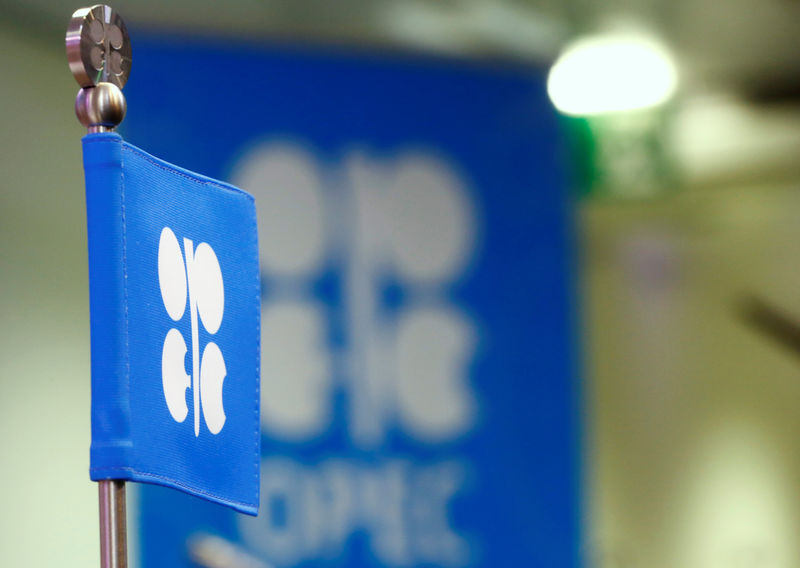BofA: Investors pour into bonds, pull back from crypto
* Saudi Arabia pumps at record rate
* Iran supply falls more due to coronavirus outbreak
* New cut takes effect on Friday
* Output by country: By Alex Lawler
LONDON, April 30 (Reuters) - OPEC oil output has jumped in
April to a 13-month high as Saudi Arabia and its Gulf allies
opened the taps following the collapse of an OPEC-led supply
pact, offsetting further declines in Libya, Iran and Venezuela.
On average, the 13-member Organization of the Petroleum
Exporting Countries has pumped 30.25 million barrels per day
(bpd) this month, according to the survey, up 1.61 million bpd
from March's revised figure.
An OPEC-led supply pact collapsed on March 6, temporarily
ending three years of cooperation and starting a battle for
market share. This free-for-all lasted until the producers,
known as OPEC+, agreed a new cutback from May. 1.
The resulting glut compounded the hit to prices that the
coronavirus outbreak is having on demand, sending oil LCOc1 to
a 21-year low below $16 a barrel this month. Even though prices
are now rising, the supply outlook remains ample, analysts say.
"Global oil demand is expected to improve as lockdowns are
eased," said Tamas Varga of oil broker PVM. "As encouraging as
it sounds, it will not lead to supply deficit in coming months."
April's output was the highest by OPEC since March 2019,
excluding membership changes since then, according to Reuters
survey records. Output by the then 14-member group averaged
30.32 million bpd.
OPEC+ agreed earlier this month to cut supply by a record
9.7 million bpd from May 1 to offset the virus- and
lockdown-induced demand slump, bringing to an end the period of
flooding the market.
While OPEC's Gulf members have already begun to limit
supply, it has a long way to go to reach the new target. OPEC's
share of the cut is 6.084 million bpd and based on April's
output, members need to curb supply by 6.97 million bpd.
SAUDI RECORD
The biggest increase in supply came from Saudi Arabia, which
pumped a record 11.3 million bpd. Still, that is less than
expected - a source briefed on Saudi policy had said April
output reached 12.3 million bpd. The April figure would have been even higher had some buyers
of Saudi crude asked to cancel cargoes because of reduced
demand, industry sources said.
The United Arab Emirates also ramped up production to 3.85
million bpd, sources in the survey said, believed to be a record
monthly rate for OPEC's third-largest producer. Kuwait and
Nigeria also boosted output.
Iraq, a laggard in making cuts in 2019, curbed output
according to the survey, due to reduced exports from ports in
the north and south of the country. Angola pumped less because
of lower scheduled exports.
Venezuela, Iran and Libya all reduced output in April. All
three were exempt from voluntary OPEC curbs because of U.S.
sanctions or internal issues limiting production.
Iran is seeing a drop in fuel use because of the coronavirus
outbreak, compounding the impact of sanctions on supply.
Venezuela, contending with both U.S. sanctions and a long-term
decline in output, posted another drop in exports.
Oil output in Libya has plunged since Jan. 18 due to a
blockade of ports and fields by groups loyal to eastern-based
commander Khalifa Haftar. Production fell by another 30,000 bpd
in April, the survey found.
The Reuters survey aims to track supply to the market and is
based on shipping data provided by external sources, Refinitiv
Eikon flows data and information provided by sources at oil
companies, OPEC and consultants.
<^^^^^^^^^^^^^^^^^^^^^^^^^^^^^^^^^^^^^^^^^^^^^^^^^^^^^^^^^^^
OPEC oil supply cuts https://tmsnrt.rs/2OYm9OG
^^^^^^^^^^^^^^^^^^^^^^^^^^^^^^^^^^^^^^^^^^^^^^^^^^^^^^^^^^^>
